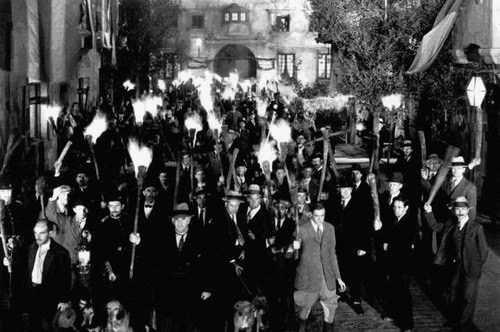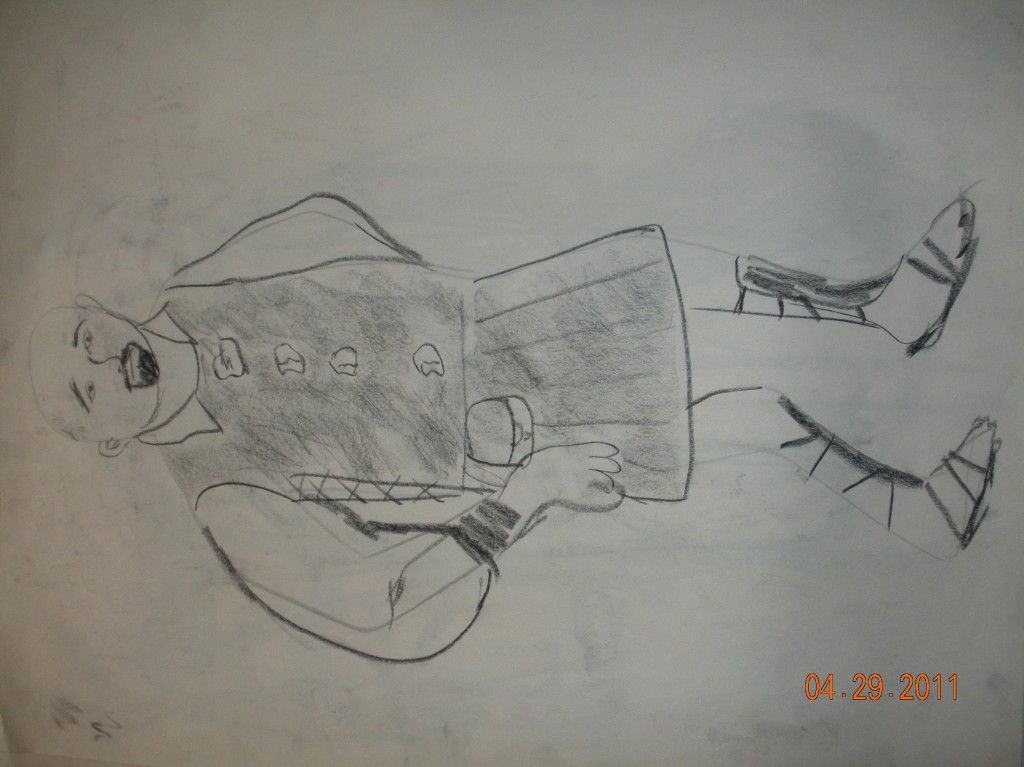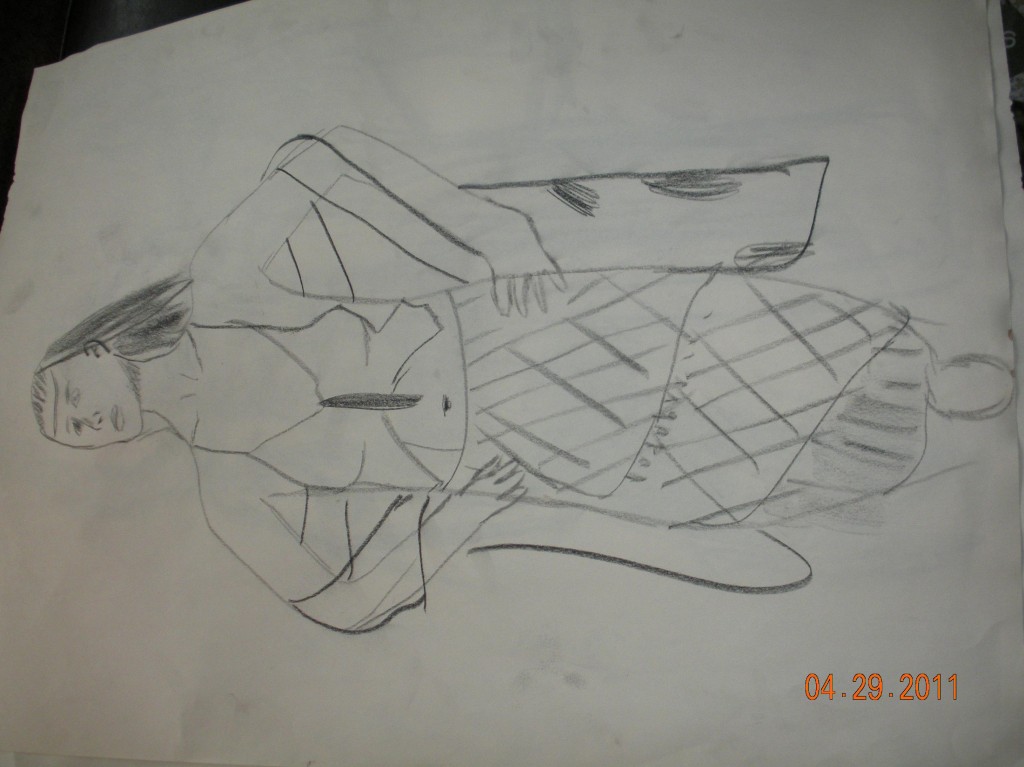written by Frank Dutkiewicz
On the day I am writing this, Daily Science Fiction is marking its 7th month of production. The online publication is listed with 41 other pro-paying publications on Ralan. I counted only 6 that offer a better rate for its authors (8 cents a word). Most have a guideline that is narrower on the type of speculative fiction they want, a few have a word count ceiling as high (10,000), and none publish as much as they have. After reviewing four months of DSF, I can’t help but notice the brightest and freshest writers in speculative fiction today have graced its pages (or web pages if you prefer). The quality of the writing I have witnessed convinces me they are sending their best to DSF first. This observation is not from a novice reader, mind you, but as an experienced reviewer (I have reviewed for Atomjack magazine and Tangent Online in the past, and do so for Rise Review currently, in case anyone is interested in my credentials). That is why I am still puzzled that Locus has barely acknowledged the magazine and Tangent Online acts as if it doesn’t exist.
To Locus’s (and Lois Tilton’s) credit, they at least paid DSF a passing review, even recommending a couple of stories for the single week they covered. Tangent Online‘s snub is another matter. The ezine reviewer has a lot more than one person to cover the industry. True, they do delve deeper than a thin paragraph for each story, but are the semi-pro and quarterly offerings they religiously review really worthy of the blanket coverage while DSF is left out in the cold? Why do they ignore the magazine? A former assistant editor for Tangent provided this answer on a popular writer’s blog.
(The editor said),the market couldn’t hope to last paying so much on a regular basis and that they also would not be able to keep up the quality. We had little resources to cover things already so it was a waste of time. The attitude is out there but the sheer volume is indeed a problem“.
I honestly don’t know how Jonathon and Michele are able to fund their project, but I found the quality of the writing improving, not suffering. However Tangent wants to use their resources is up to them but I can attest that reading DSF was anything but a ‘waste of time’. Here’s hoping they acknowledge they were wrong about DSF’s prospects and reevaluate their policy.
But I digress. Who reviews a publication shouldn’t determine whether it’s worth reading or not; it’s the quality of the stories they choose to publish that should define them.
On to this month’s issueâ€
The Stories
The protagonist in “Delusional” by Ross Willard (debut 12/01) is explaining to Dr. Bennett on what deep space is like and why he returned to the past. He likes his job but the work is demanding. The company he works for is generous but if a worker fails to meet the grueling standards of the job, they are recycled. To escape this fate, he returns to Earth, so he claims.
The story is set as if you are watching a health care worker assessing the mental state of a patient. The protagonist’s story is intriguing; you’re just not sure if it is real or not. As a reader you’re sure the truth lies somewhere in between.
I’ve got to hand it to Mr. Willard. I figured “Delusional” had an ‘either/or’ ending. He managed to surprise me by having it land in the middle. Nice story.
“Journey’s End” by Christine Lucas (debut 12/02) is a tale of Aisa. She scrubs shirts in the waters of a river, washing away the sins of others. A traveler greets her as he talks of his search for god. This stranger has been wandering for a long time, and his shirt is caked with enough sin to weigh humanity down.
The story is less about one man’s story than it is about a woman’s willingness to relieve her fellow man. Aisa works hard, scrubbing diligently as a service to her fellow man. Some shirts she won’t clean but the man who greets her is no ordinary sinner.
The story didn’t move me as it should have. Perhaps it was because Aisa’s gift (if you can call it that) didn’t really seem all that grand. The twist of who the stranger ended up being I felt mixed about. Maybe because it felt too convenient, I don’t know. “Journey’s End” was a nice attempt at enlightenment, but the ‘light’ wasn’t bright enough for me.
“Never the Twain” by Lon Prater is the story of Mark Twain set in a south that won the Civil War, told in the pages of a lost journal. A 70ish old Twain finds himself inexplicably in his 30’s again as he rows a boat into Mobile, unsure how he was transported back into time. The wise ole Twain, now in a young man’s body, acclimates back into southern society, but is soon caught up in the injustice of slavery in the last half of the 19th century. The accomplished author revives an old novel and makes it new to help right a wrong.
This author does a fine job writing a convincing Twain in this alternate historical piece. Unlike other southern victory stories, the Confederacy in this tale isn’t doing as well. The economy is sluggish so owners make due by selling their assets, even when the practice divides families. The great Twain battles the injustice the best way he can, by following Harriet Tubman’s lead.
As a big fan of AE, I take a harder line with the sub-genre. Mr. Prater did his research for this piece but unfortunately he couldn’t make the storyline as engaging as Mr. Twain would have. The story, although told well, became dull. Too bad, because I liked the idea.
It is 536289’s first day on the job in the brothel in “Shelia” by A. Merc Rustad (debut 12/06). The android worries she is malfunctioning because she is experiencing anxiety. Her first client is an unlikely john to get. He is interested in 536289 for who she is, and not for the service she was designed for. He knows the android wants to be more than what she was meant to be, and is willing to sacrifice everything for her to receive it.
“Shelia” was a story that went from great to disappointment for me. I rather liked the protagonist in this story, but hated how the author changed her. The last half took a, for lack of a better description, masochistic turn. I did not like the solution to Shelia’s problem. Unnecessary.
In “Heartbeat” by “Erin M. Hartshom” (debut 12/07), Ariana and Yara are Siamese twins, princesses with one destined to be queen. Power is never easy to share, and can pull even tightest of family’s apart.
This very brief tale begins in the middle of a spell. The story is too brief to pull off well, in my opinion.
Sarah is getting enough attention from Michael in “Surprise Party” by Steven Saus (debut 12/08). She is about to leave him but is giving him one last chance to satisfy her needs. Michael knows there isn’t enough of him to meet her demands. Thanks to advancing technology, he may yet succeed.
The story is set in the moments before Michael springs a surprise party for Sarah. The surprise is meant to shock the reader as much as Sarah. A hint of what was about to happen might have helped. Instead it elicited an eye roll from me.
“Flood Myth” by Brian Dolton (debut 12/09) is a lecture. The narrator expounds on the merits of water. The story is philosophical, pointing out how water is essential to the earth and its relationship to clay.
The story can be interpreted as a one-on-one conversation with a higher power. To me it still came off as a lecture.
In “Perfect Black” by Will McIntosh (debut 12/10 and reviewed by James Hanzelka), Jahn is a memory junkie and a musician. One day he comes across the most beautiful music he has ever heard in a memory. He can’t stop until he finds the source, Leslie. She ultimately gives him her music but insists he take more of her memories. This leads to a stunning revelation.
This story is very reminiscent of a P.K. Dick story, where the question of what is reality and memory is explored. The path followed by Jahn and Leslie is both engaging and full of twists and turns. It is a good read, particularly for someone into more esoteric questions about what makes us individuals.
“Drink” by Tara Barnett (debut 12/13 and reviewed by James Hanzelka).
The favored daughter grows a special wine, hoping to lure a husband, only to watch others succeed. As the years pass she becomes more desperate adding and changing the brew with no effect. Finally, no longer seeking a mate, she retreats into the garden and growing things. Is there a man that can succeed in drawing her out of her growing madness?
The story is a pretty good allegory for life and how the early promise of life can be altered by expectations and parental mis-guidance. This tale is highly stylized and may not be for everyone, if one is willing to invest the time they will be rewarded with a richly layered tale with many undertones and meanings.
“Buy You a Mockingbird” by Eric James Stone (debut 12/14) is a bedtime story. The protagonist is a mother who is telling her child a tale of a woman who created a time machine and went into the future, only to create a rip in the continuum when she returned.
The protagonist’s narrative is priceless. She is full of regret, but regret you could never imagine. This short tale has an ending I just loved. A well done work of science fiction wrapped in a small package. Recommended
A new moon in the sky marks the coming of a new Wizard King in “Maker of the Twenty-First Moon” by Sean Patrick Hannifin (debut 12/15). The wizard kings of the past were all tyrants. Jonlen and Slip have suspected Torkwill of wanting to be the next. A legend speaks of a wizard king’s only moment of vulnerability, on the night they make a moon.
“Maker” is a story with two sides. Torkwill wants to make the world a better place and shares the event with his son. Jonlen and Slip wish to take no chances, breaking into the wizard’s home to drag him into the forest. They refuse to heed the wizard’s warnings, Jonlen sure they are nothing but a bluff. He wants to make sure history is not repeated, even if he is the catalyst for past mistakes.
This story is rather good. It had an outcome I predicted but it was never obvious. Torkwill is convincing as a man trying to save his own life with Jonlen’s perspective. Not too bad.
Emjid is out to master an ultimate game of masquerade in “Grocery Games” by Anne Patterson Friedman (debut 12/16). He is a novice alien, mimicking a human as he shops in a grocery store. He believes his research of Earth customs covers all the bases to fool the weary humans, but is research better than experience?
“Grocery Games” has a premise where people are aware of the aliens. For unknown reasons, what seems to be harmless fun is a major problem. The story doesn’t delve into answering why. In fact, the entire story seemed to be a set up for a rather weak punchline.
“No Spaceships Go” by Annie Bellet (debut 12/17 and reviewed by Dustin Adams)
Sometimes, when a dream comes true, it really messes with your life.
Dylan and Meek are from opposite sides of the tracks. Yet they have found a way to be together. One of their favorite activities is watching rockets blast into space en route to exciting places. It’s during these times they daydream of a secret place all their own, a garden where society’s restrictions have all vanished.
When Dylan’s family is selected for the next launch he must leave Earth, and more importantly, Meek. At sixteen, Dylan is powerless to act on his own wishes and must be on the shuttle that will take him from his friend.
Their dream is forever shattered, but Dylan has two weeks to try to make things right, to do… something. He uses his time wisely and builds a secret place for the two of them. A place – where no spaceships go.
I tip my hat to the author, Annie Bellet for capturing so profoundly the pain and angst of a teenager. A truly great story can make you feel what the protagonist feels, not just read what they are doing. This is such a story. Well written, and well done. Recommendation.
“The God Solution” by M. E. Castle (debut 12/20) is about an ordinary girl who lives with a god, her little brother. Deliah is Deece’s favorite sister. She always makes sure she has happy thoughts for her gifted brother. They are out to chop down a Christmas tree, that’s all. Anything else Deece wouldn’t like, and hiding anything from Deece would not bode well for his favorite sister.
The story is reminiscent of the old “Twilight Zone” episode “It’s a Good Life”, in which a very young Billy Mumy terrorizes the adults with his omnipotent powers. Deliah is the final member of her family left. Her ability to disguise her real thoughts and feelings has become crucial for her own survival. Deece adores her, as much as a megalomaniac with the power to alter reality can adore a person. Deliah feels she is the last barrier between her brother and the rest of humanity.
This story was well done. I usually frown upon flashbacks but the author used them wisely to tell this tale. The ending sentence didn’t have the impact it should have but nevertheless this story was well worth the price of admission for me.
“Nothing but the Truth” by Steven V. Ramey (debut 12/21) is a tale of a mother who wishes to do what is best for son, even when it’s a bad idea. Mrs. Cheney is a single mother. Her teenage boy is making some bad choices. Medical science has the solution for her, a device in his brain that will help him to stay away from bad influences.
This story has a “Clockwork Orange” like theme. Mrs. Cheney is an overprotective hen who hasn’t made the connection that the apple hasn’t fallen far from the tree. She kids herself that her decision is for his good, and not her way of establishing control she never found for herself. I thought the tale was well thought out but found the ending, although poetic, obvious. Nevertheless, it was still enjoyable.
The protagonist in “The Pillow Zone” by Scott Lininger (debut 12/22) wakes up on an ordinary Saturday and receives a surprise in his shower, a magical beanstalk that bears delicious fruit.
The first half of this tale had nothing to do with the odd plant growing in the protagonist’s shower drain. It sounded like a great morning in the making but had little to do with the plot. I found the writing to this piece sharp but the story jumbled. The first half could have been missing and the story wouldn’t have changed. As a result, it dulled the luster of the entire piece.
“A Christmas Frost” by Robert E. Keller (debut 12/23) is a tale about a rite of passage involving a nasty Christmas tree. Chopping down a wretch tree has been a part of Brian’s family for years. The enchanted trees always put up a fight and require a special axe to chop down but provide protection for a family every Christmas. Brian sports proud scars from trees of the past. His son James is eager to wield the Fungorn’s Axe for himself and can’t wait for his presents on Christmas day. The family’s tough times make the prospects of presents unlikely. James intends to take his disappointment out on the tree for his empty Christmas.
By the date this was published, I can see why the editors bought this piece. The timing for it was right. Brian spends much of the story reminiscing. He feels bad for not having a job but not enough for me to wonder of his level of motivation. The context of a grumpy tree in your living room is admittedly appealing to me. The tree didn’t disappoint but the author to use it so sparingly was.
I expected more from this tale. Perhaps Mr. Keller wanted a piece that was more reflective of the holiday spirit but for me the promising storyline fizzled. The ending left me feeling as cheated as poor James was on Christmas.
His Majesty attempts to make amends to his wife in “The Two of Us, After” by Steven Popkes (debut 12/24). King Mark has lived a lifetime of regrets. He wants to forgive his wife and grieves for his nephew Tristan. Mending broken relationships would be easier if he were sure he was awake.
“The Two of Us, After” is a tale of court intrigue from the perspective of a regretful king. His Isolede has not been faithful or honest with her husband but has the sense to be obedient. The story was not grounded in reality, however. Mark slides from dream to dream, each ending in shock displays of uncharacteristic behavior of his loved ones.
The tale was way too soap opera-ish for my tastes. The speculative fiction element was barely there. This story look as if it would have been more at home in a romance or historical genre based publication. If neither of those genres interest you, this story likely won’t be your cup of tea.
In “Not the Chosen One” by Amber D. Sistla (debut 12/27) an envious Greki wallows in his own pity of living in the shadow of Ekkli, the Chosen One. Greki is one of the best of a mysterious monastery but a very distant second to Ekkli’s abilities. His jealousy of being bested consumes Greki, but he discovers there are emotions that are far worse to wallow in.
Greki reminds me of the protagonist in the movie Amadeus, how he realizes his great skill is not even in the same league of someone touched by God. Greki’s envy is understandable and to his credit, he attempts to overcome his feelings. His emotional shortcoming is the crux of the twist the author inserts.
The writing is great in this piece, but I was expecting the twist and therefore wasn’t surprised when it happened. “Not the Chosen One” is a nice story but I was immune to the gravity of its emotional impact so wasn’t floored by its ending.
“Palindrome” by Will Arthur (debuted 12/28 and reviewed by Anonymous)
A palindrome is something that can read forwards and backwards and is the same. As a point of interest, Wikipedia has a superb example found written on the walls of Herculaneum in Latin.
This story is a loose form of a palindrome with slight twist and, I have to say, it has been done very well. It starts off with a Timeguard who has tracked down a man–his quarry–to a small bar. The problem is the bar and everyone in it are caught in a palindromic time snag. Needless to say things don’t pan out according to plan.
In order to remain with the constraints of a palindromic story an author has to make some sacrifices in terms of details and explanations. With that in mind,ÂI think Mr. Arthur handled the complexity of creating this story very well and achieved, in my opinion, exactly what he states wanted to in the notes after the story –to create a palindromic story that also moves forward. Recommended.
“The Plum Pudding Paradox” by Jay Werkheiser (debut 12/29 and reviewed by James Hantzelka). J.J. Thompson is confronted by a stranger who pleads with him to dissuade his student, Ernest Rutherford, from conducting his famous scattering experiment that alters the perception of the structure of the atom. The consequences of this experiment, the stranger argues, are too horrible to contemplate. Thompson finally agrees, but will he write the letter?
This is a truly clever twist on the traveler paradox of time travel. I really enjoyed the story, but it may be a little too esoteric for someone with less of a science background. Despite the few reaches in actual fact, such as the link between Rutherford’s experiment and quantum theory, it is still a good read and cleverly done.
“Variety” by Jill Zeller (debut 12/30 and reviewed by James Hantzelka) Natasha is a homebody, invested in her garden and trappings of modern life, car, home, etc. She is married to Curtis, a budding musician who is working on establishing himself in the business. This leads to Natasha at home and Curtis on the road and to an inevitable conflict as she becomes more invested in home life and he is more interested in his career. Conflicts arise over how to spend money and goals.
To me this story really didn’t go anywhere, nor was I particularly invested in the characters. I felt worse when the dog had to be put down than about any of the interplay and conflict between the two main characters. The story offered me no real insight into these people than I could get from a newspaper article about this period of their lives.
In “A Matter of Time” by Jaime Lee Moyer (debut 12/31) a co-worker approaches Julia with a priceless offer, his life for her. Julia’s allotted time is running out. She had weeks left when Myles approaches her with his no-strings gift of an additional twenty years.
“A Matter of Time” is a short story with incredible depth. It is set in a future where your expiration is determined in advance. Factors of life (childhood illness, taxing of social services), determines when time is subtracted. Time can be transferred and is often sold on the black market. Julia lost much of her time while helping others. Myles is a man with relatives in power. He often clashed with them because of how they used that power, but they had a unique way of silencing him. Now he wants to give his life to Julia as a way of making amends for his guilt.
Ms Moyer should be commended for this story. She wrote an intriguing future with compelling characters. The storyline was a bit blue for me, which is the only reason why I balked at a full recommendation. Nevertheless “A Matter of Time” is award-winning writing. I was impressed.
Analysis
Even only covering a third of the year, Daily Science Fiction has produced enough outstanding material to fill a “Year’s Best” anthology. Based on these four months I concludeâ€
a)ÂÂÂÂÂ The editors deserve Hugo and Nebula nominations (Unlikely, this year)
b) Many of the stories deserve a further evaluation so they can be included for further honors. Andâ€
c)ÂÂÂÂÂ Hugo and Nebula should be offering a separate award for Flash length fiction
The editor’s should also be commended for their innovation of distribution. Sending a story a day for their readership is genius. Here is hoping they get the recognition they so justly deserve.
 Frank went a little overboard with his April Fool pranks this year and is currently in hiding.
Frank went a little overboard with his April Fool pranks this year and is currently in hiding.Special thanks to James Hantzelka, Anonymous, and Dustin Adams, who has an updated blog http://dustintadams.blogspot.com. I appreciate you all, and Dave, for helping me produce these reviews as well as keeping my whereabouts a secret.
Anonymous is an accomplished author. He is credited with writing such classics as The Book of Dead, Beowulf, The Key of Solomon, The Autobiography of a Flea, and Go Ask Alice to name a few. He is also known for writing many works of poetry, inspirational phrases, and several Psalms in the Bible.









